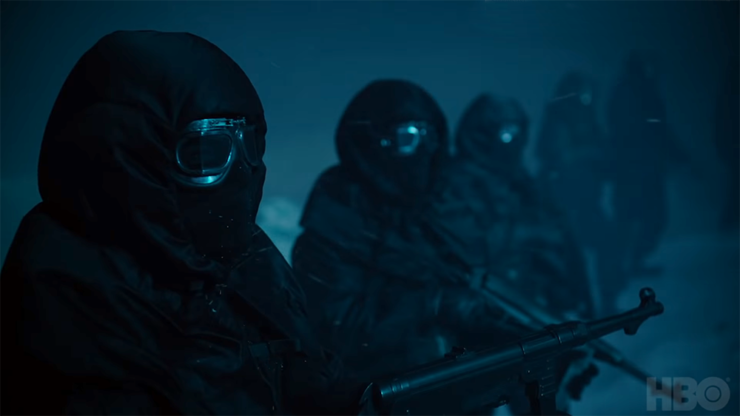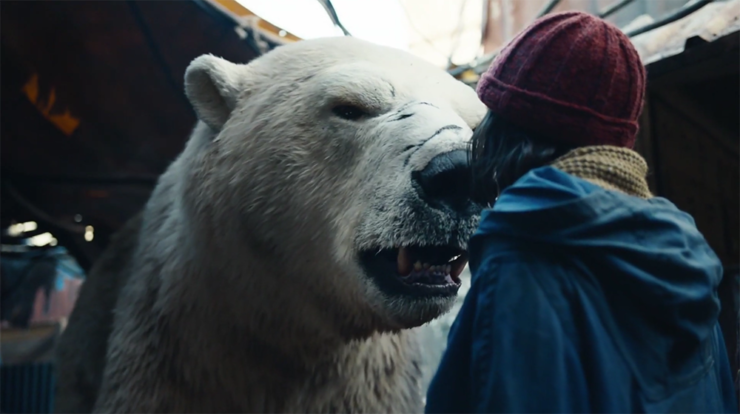A couple weeks ago, I wrote about my disappointment with some of the continued racist tropes that the His Dark Materials television series inherited from its source novels. Some of the responses seemed to indicate surprise that Pullman’s iconic and beloved series contained any racism whatsoever. I want to be clear and careful here: Pullman’s series contains few to no instances of overt racism like we might find in the works H.P. Lovecraft or Rudyard Kipling. But what His Dark Materials (the book series) does contain and what His Dark Materials (the TV show) has unfortunately continued with are a number of subtle racist and colonialist tropes that the show would have done well to rewrite and rethink.
Central to the problematic nature of Pullman’s narrative is its genre. Pullman writes in a mode that is sometimes referred to as “Boys’ Own Stories” (taking its name from a 19th-century literary magazine aimed at young boys). This is a broad category with a variety of entries and subcategories but, at its core, it is fiction either aimed at young boys or adopted as fit for them to read. It usually features an adventurous narrative focused on the unraveling of a sinister mystery or a dangerous journey to far-off places. It has its origins not only in the stories of Boys’ Own magazine but also in the work of late 19th-century novelists like Robert Louis Stevenson (think Treasure Island or Kidnapped) and Rudyard Kipling. It is evenly split between stories written explicitly for boys (Hergé’s Tintin comics, Edward Stratemeyer’s Hardy Boys and Tom Swift novels, and the works of W.H.G. Kingston) and stories intended for readers of various ages but often popular with young boys because of the adventurous subject matter (novels by Jules Verne, Edgar Rice Burroughs, and H. Rider Haggard).
Pullman’s novels are filled to the brim with tropes from Boys’ Own-style adventure novels (it should be noted that his previous series, the Sally Lockheart books, are explicitly an homage to the genre), which is a large part of their charm. The fact that he employs these tropes within a narrative centered around a female protagonist is even more laudable, seeing as the vast majority of the genre traditionally focuses, exclusively, on boys. But among tropes that glorify the candor and wit of children and provide misadventure with a moral, there are also highly colonialist and imperial themes, as well as a fair share of racist caricatures in these works. Let’s talk about some of the specifics.
The Demonization of Non-white and Indigenous Peoples
Boys’ Own stories and Pullman’s novels traffic in the depiction of far-off, “exotic” locales. Much of the first novel (and presumably the first season) in HDM takes place in the unspecified “North.” The region seems to include Lapland (a region of Finland in our world, but expanded into a larger nation in Lyra’s) as well as nebulous regions that include the Witchlands (Lake Enara, Serafina Pekkala’s clan appears to be based off of our world’s Lake Inari in Northern Finland), Svalbard (an archipelago that belongs to Norway in our world but is an independent kingdom of panserbjørn in Lyra’s) and Tartary (which is a nebulous historical region in our world that Europeans invoked to indicate large swaths of central Asia but is an independent nation in Lyra’s). It is this last region that concerns us most.
Pullman includes Tartars in Northern Lights as the hired security at Bolvangar. With their uniformly lupine daemons, they are represented mainly as faceless muscle, meant to appear threatening but devoid of characterization or any deeper specificity. In both the novel and the show, there is delighted discussion of how Mrs. Coulter has fought Tartars in the past. This is presented, not as some kind of international conflict, but as a feature of adventure in the North. Pullman’s Tartars are reduced to a natural phenomenon: a peril of the landscape, no different than cliff-ghasts or the cold.

Pullman’s distasteful presentation of non-Western people isn’t limited to Tartars, either. Early on in Northern Lights, Tony Costa rescues Lyra from kidnapping. His line, immediately following is, “We thought they was Gobblers, but I reckon they were Turk traders” (104). While the Ottoman Empire did, in fact, have slaves and there is the possibility that, in Lyra’s world, with its alternate history, an Ottoman Empire with slaves still exists, Pullman’s worldbuilding is not robust enough to include this detail as anything other than a bit of racist frippery. The reference feels drawn directly from a well of dubious boys’ own adventure tropes rather than a meaningful decision in the text.
The show wisely rewrites this particular plot point so that Lyra is, in fact, kidnapped by the Oblation Board. This rewrite streamlines the narrative while also cutting an unpleasant, problematic sentiment. The series’ handling of Tartars is less graceful. Tartars are still faceless mercenaries guarding Bolvangar. At least, we rarely see their faces during the final battle which otherwise would force the show to either cast multi-ethnic “tartars” or have the gyptians fight against people who look uniformly Asian.
These are two instances where racist subplots and worldbuilding in the novels have either been resolved or muted by the show. But there is a slightly more unavoidable issue represented by the character of Iorek Byrnison. While Iorek is, of course, an armored, sentient polar bear and not a specific caricature of a particular ethnic group, he does generally accumulate tropes associated with the figure of the “noble savage.”
For those unfamiliar with the idea, the noble savage is essentially an indigenous person who is portrayed as culturally primitive but whose absence from “civilization” (read, European civilization) has made them morally superior. These capital “R” Romantic ideas are rooted in scientific racism, but have found purchase in numerous literary examples. One need only look to early White American writing about First Nations people to see numerous examples—e.g., Chingachgook from The Last of the Mohicans, or the historical but mischaracterized protagonist of Longfellow’s Song of Hiawatha. In fact the use of the Noble Savage as a stock character is woven throughout pop culture: Films like Dances with Wolves, and The Gods Must Be Crazy, TV shows like The Lone Ranger, and classic children’s literature like The Indian in the Cupboard all place a Noble Savage at their center.
Enter Iorek Byrnison: a violent, intensely honor-driven character from a “primitive” culture who teaches the protagonist about life by virtue of their (in this case eventual) moral superiority. While the panserbjørn are, of course, not human beings, it is striking that much of the culture Pullman invents for them is based firmly in a series of Noble Savage stereotypes. When this is paired with offhand remarks in both the novels and the show about how Iorek was tricked into dishonorable behavior because he was given alcohol, we have a character that is an amalgam of Noble Savage stereotypes with a hint of First Nations-directed racism thrown in. The show decides not to write around this particular plot point and, though there is not much time in the series to further develop panserbjørn culture beyond Pullman’s novels, this element of Iorek’s characterization remains an uncomfortable relic that surely would not have been included in a fantasy series composed from whole cloth in 2019.
It is important for me to note that the kinds of racism found in Pullman’s novels and perpetuated by the show are few and far between compared with much of our problematic past. Where HDM’s nemesis series, The Chronicles of Narnia, makes the plot of an entire installment out of what comes down to Lewis’ deep-seated Islamophobia, His Dark Materials stumbles in a less overt way, in its inclusion of some European stereotypes about people from non-European places and an over-reliance on outdated and patronizing tropes. I certainly would not argue that Pullman is the kind of frothing, outspoken racist that needs to be publically shunned (though an apology or an admission of prior ignorance would be a helpful step in a more positive direction).
Instead, what I think is unfortunate here is the show’s perpetuation of Pullman’s poorer instincts. These tropes, and their perpetuation, take part in the kind of casual racism that too often floats by unremarked upon precisely because it is less galling than the rants of hopeless bigots. But that is, in and of itself, a problem. The show had a chance to rewrite some minor bits of Pullman’s narrative for the better and instead went with a regurgitation of the same. The Boys’ Own Adventure genre is full of delights; Pullman’s contribution to it is also delightful. But it is in need of an update—a recognition of and separation from the colonial and racist instincts that gave rise to its harmful and outdated clichés—and it is disappointing to see the show fail to do so.
Tyler Dean is a professor of Victorian Gothic Literature. He holds a doctorate from the University of California Irvine and teaches at a handful of Southern California colleges. He is one half of the Lincoln & Welles podcast available on Apple Podcasts or through your favorite podcatcher. More of his writing can be found at his website and his fantastical bestiary can be found on Facebook at @presumptivebestiary.










